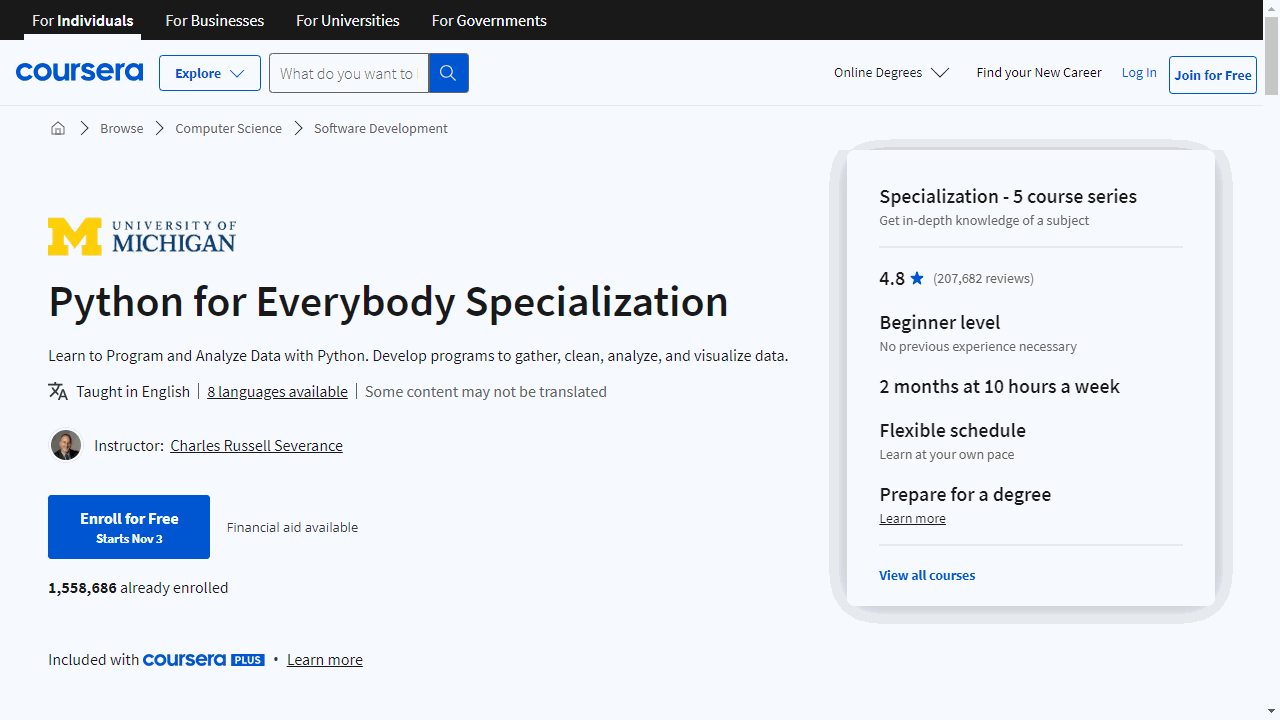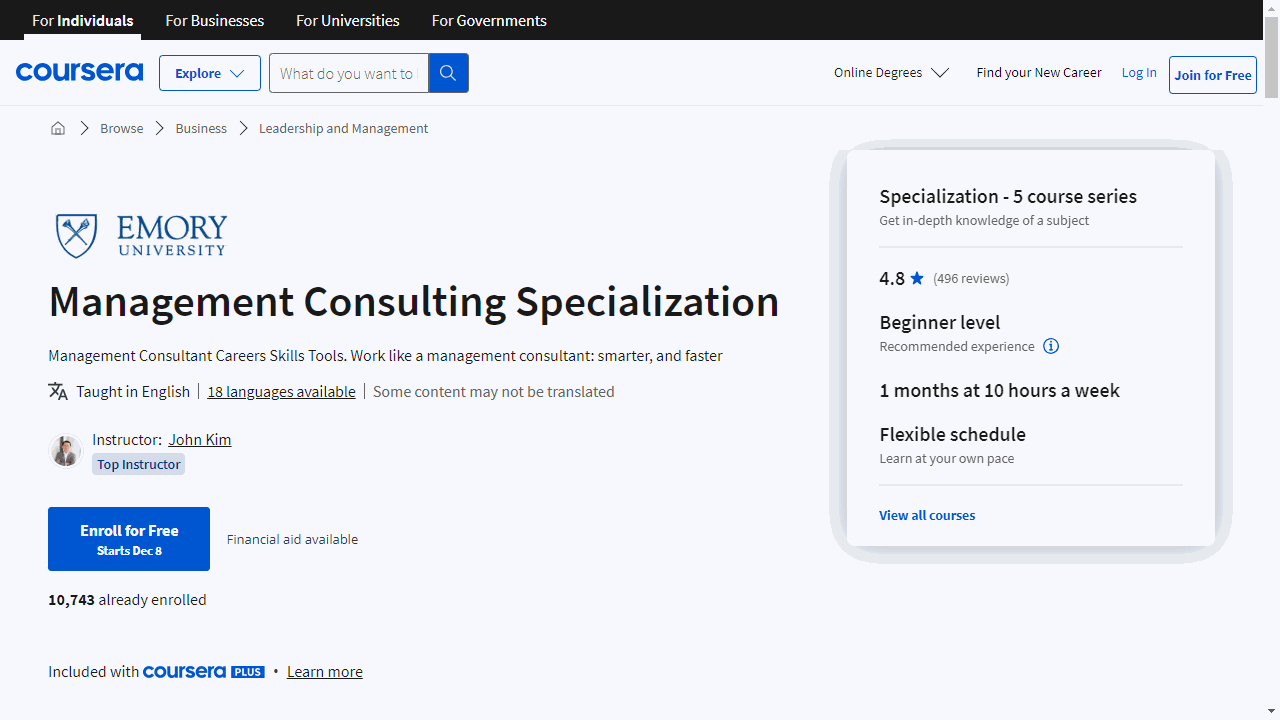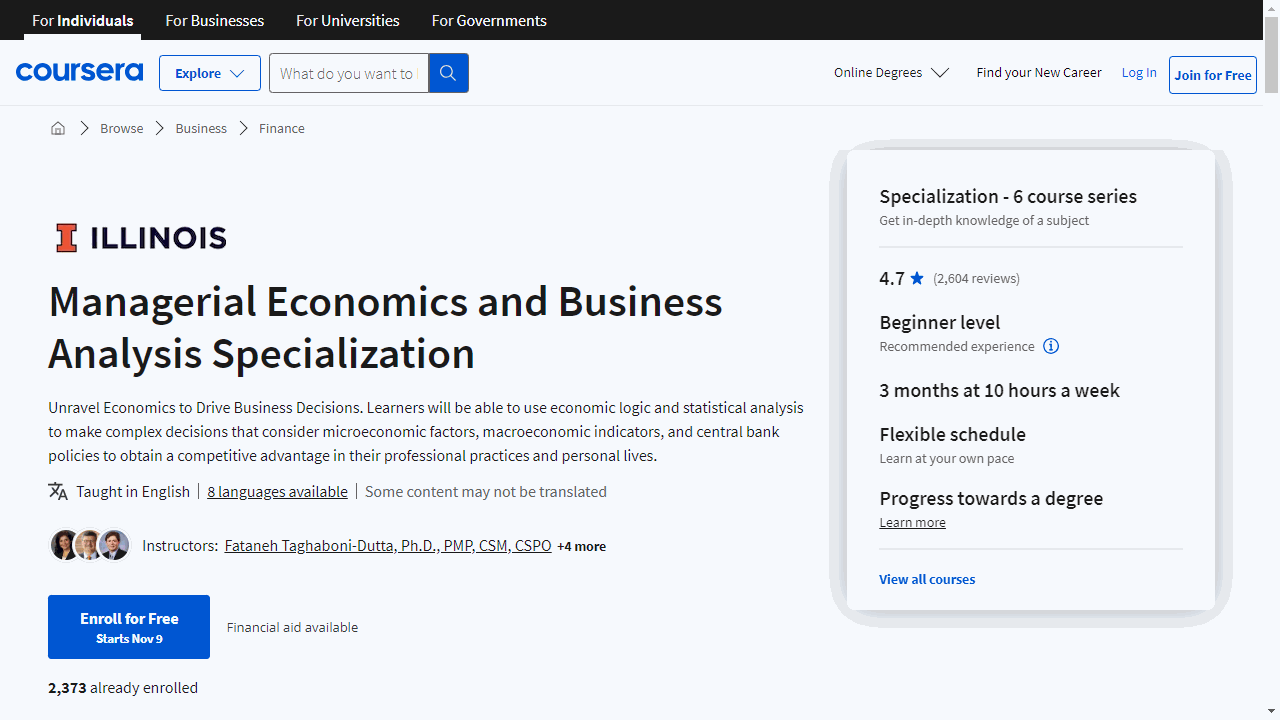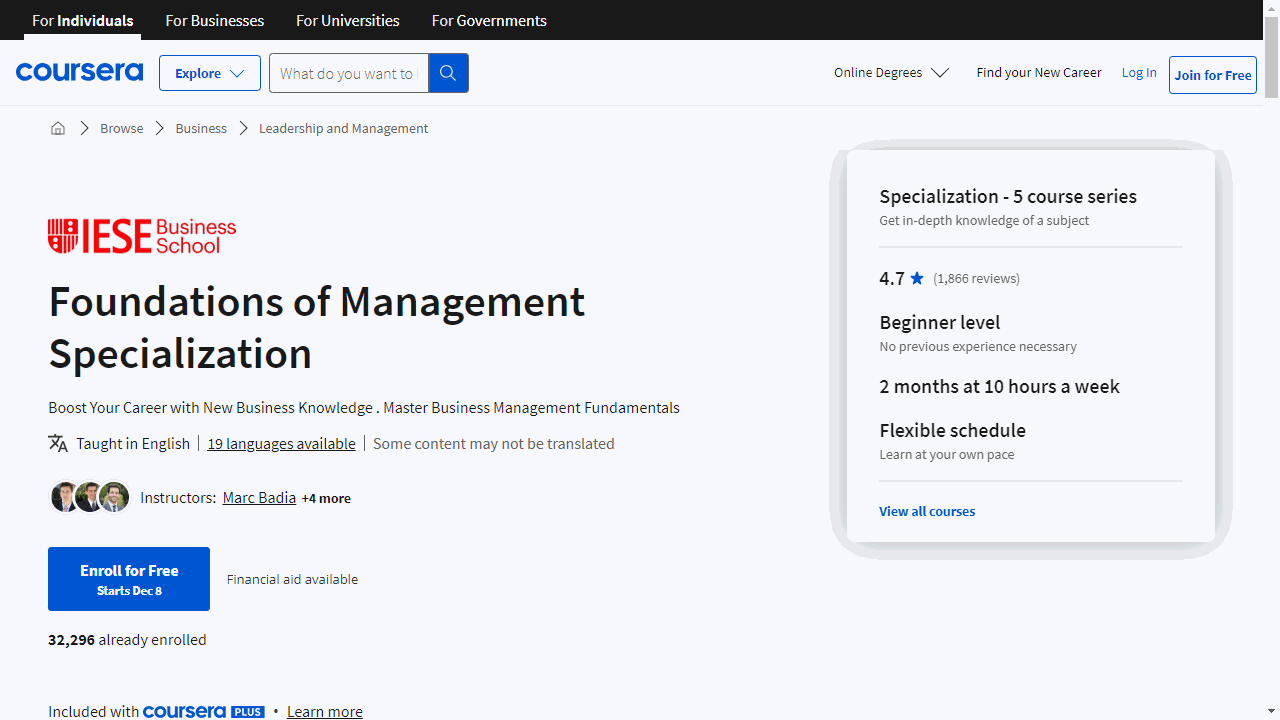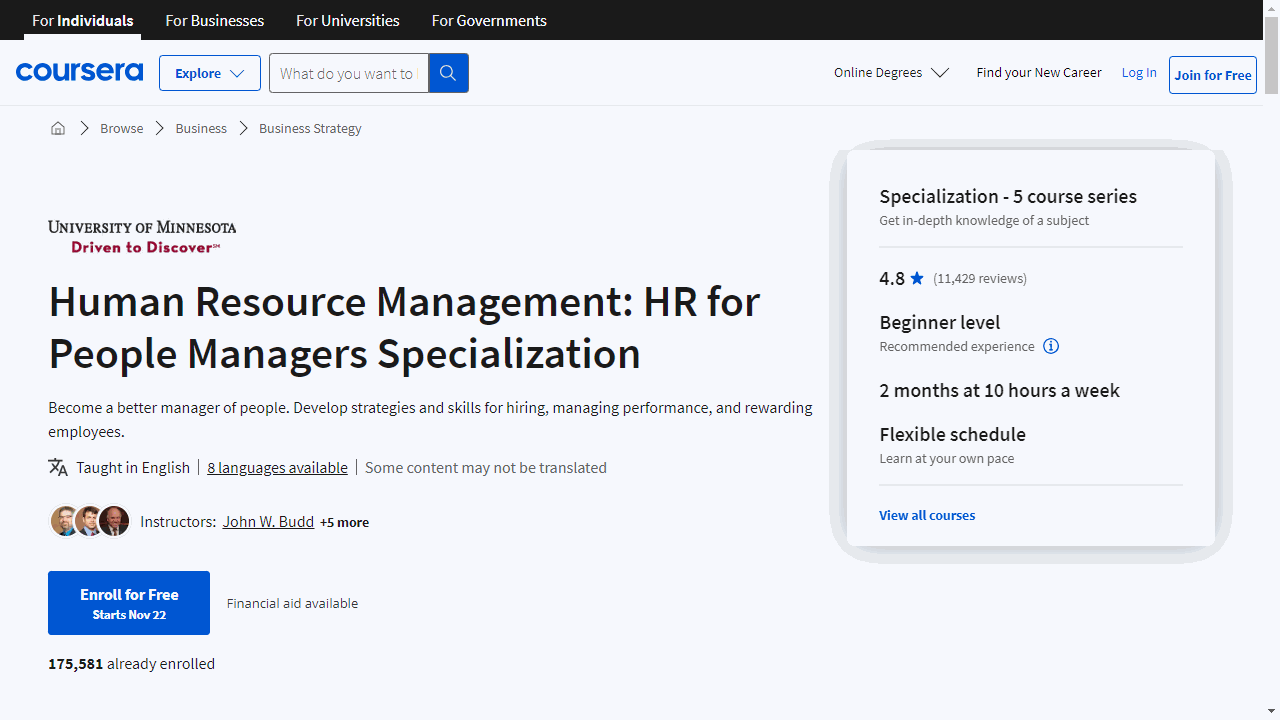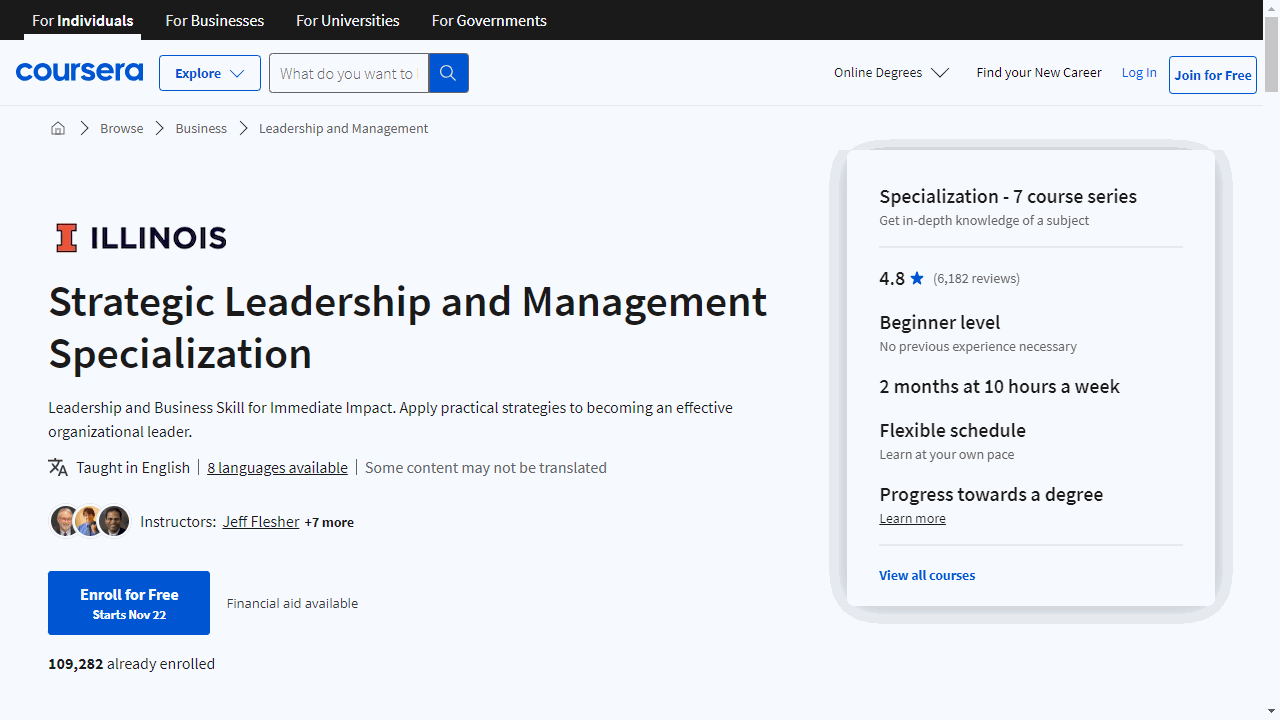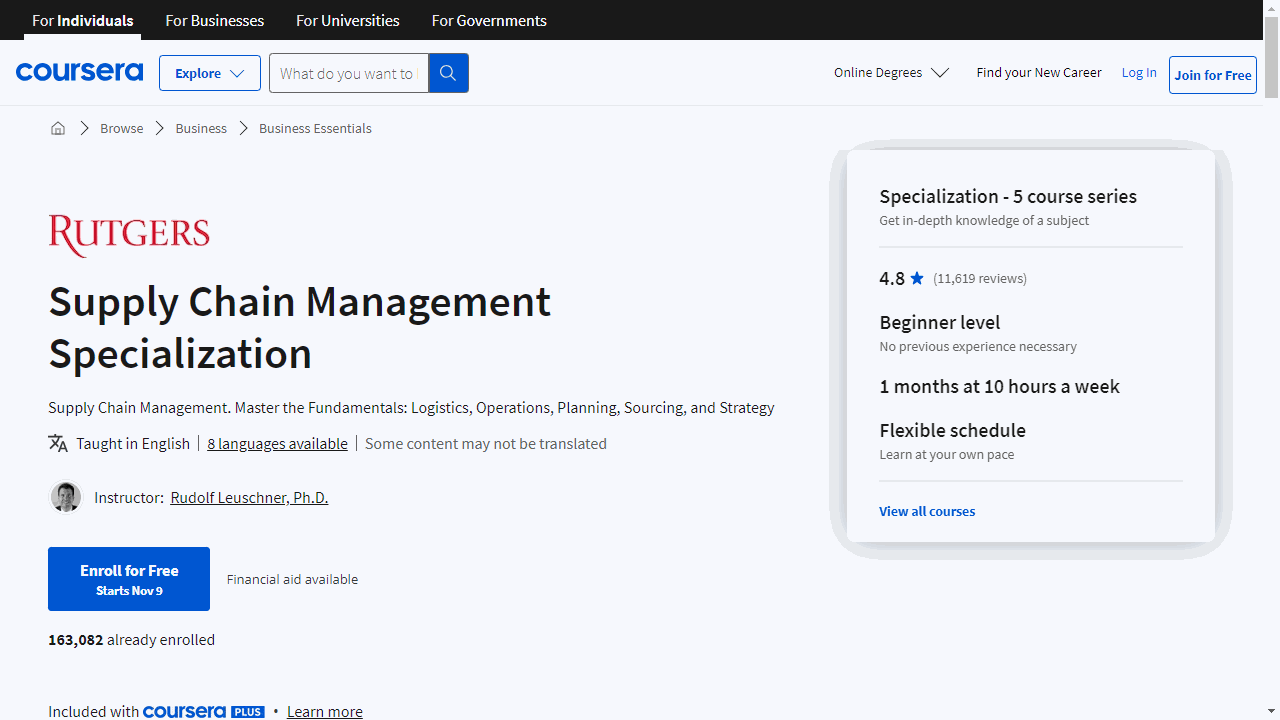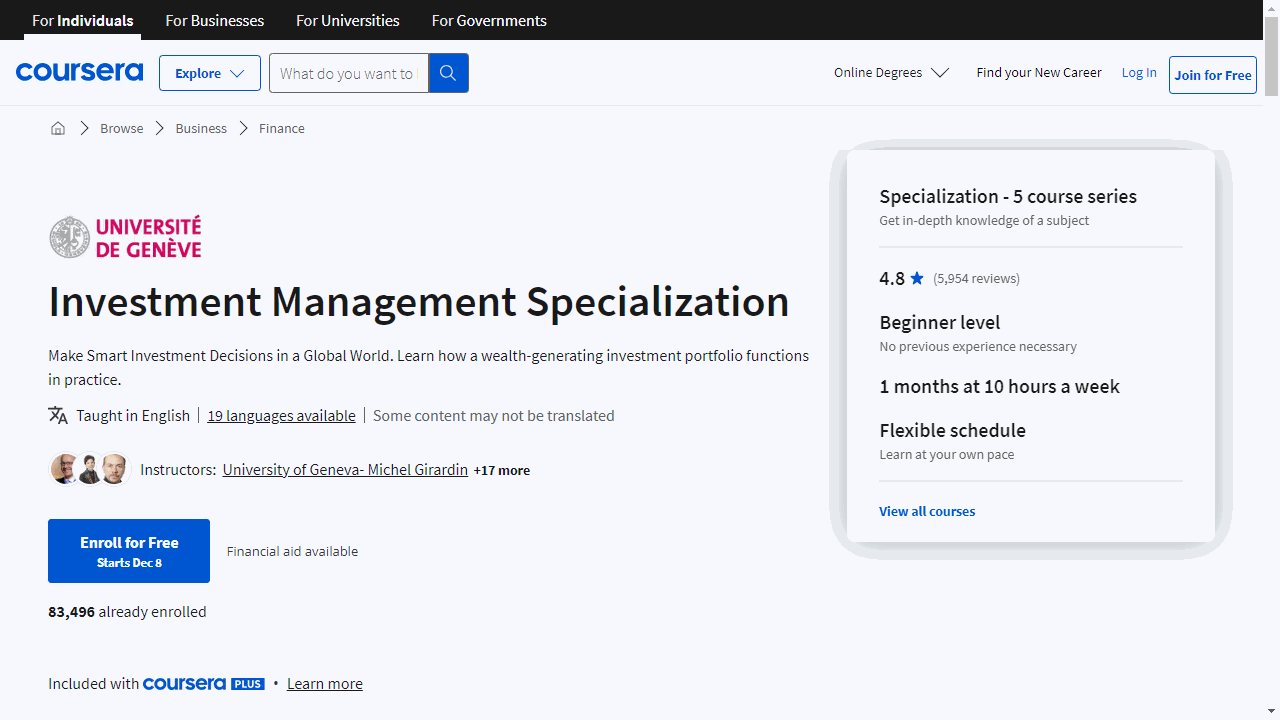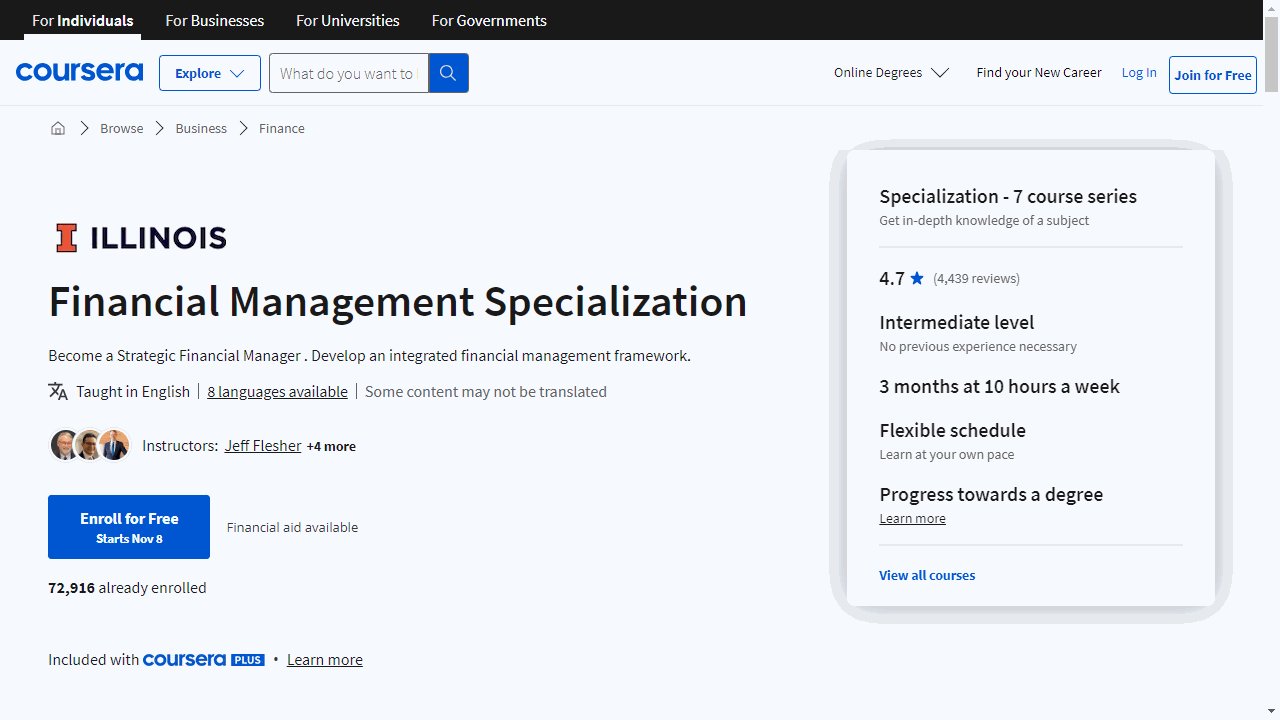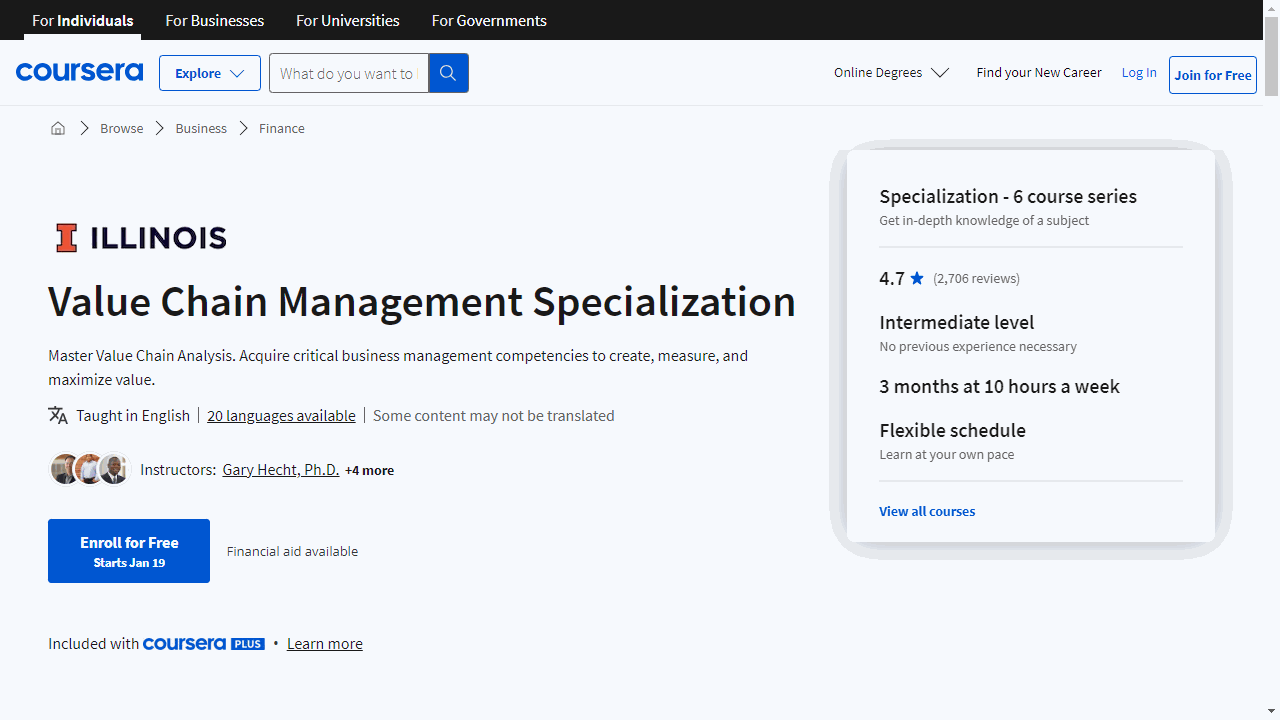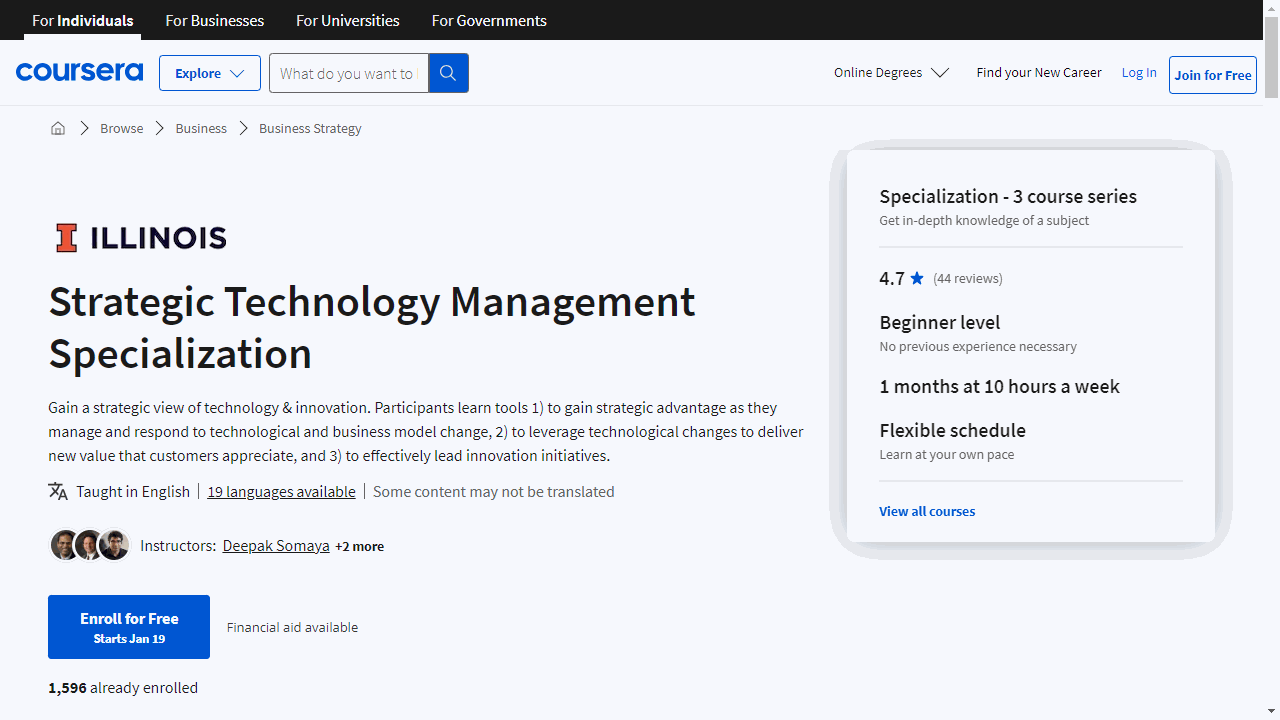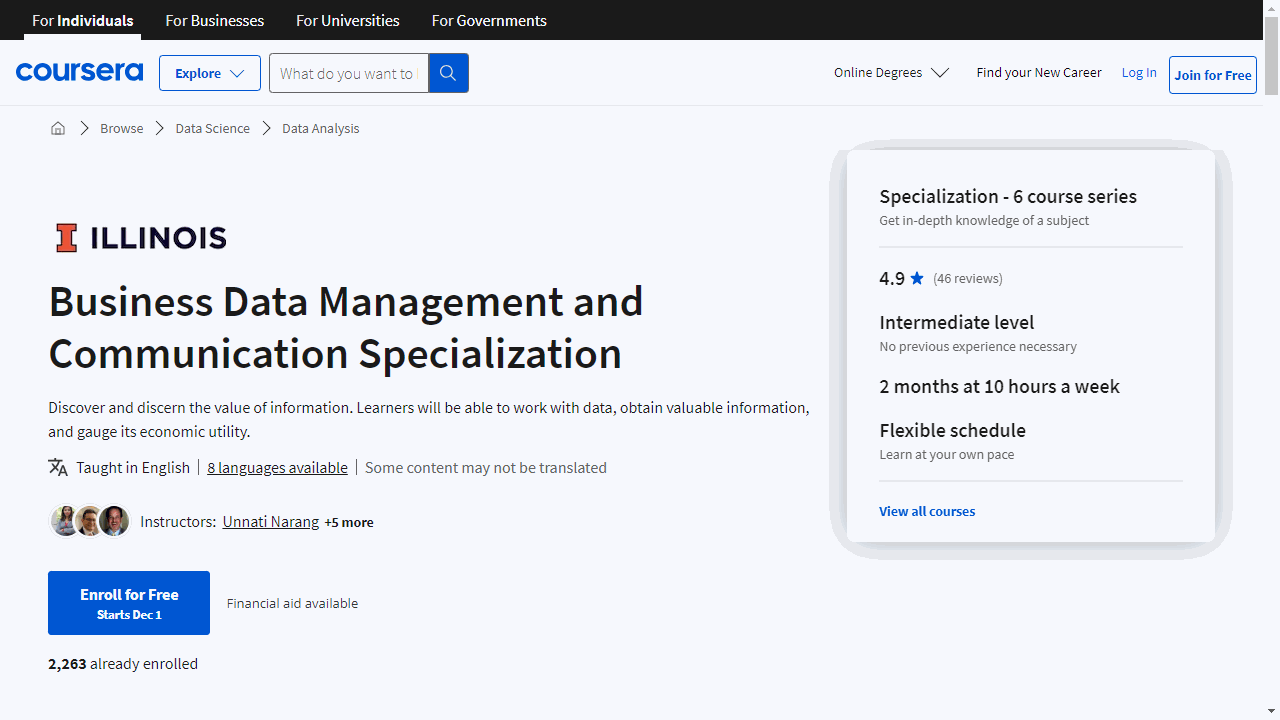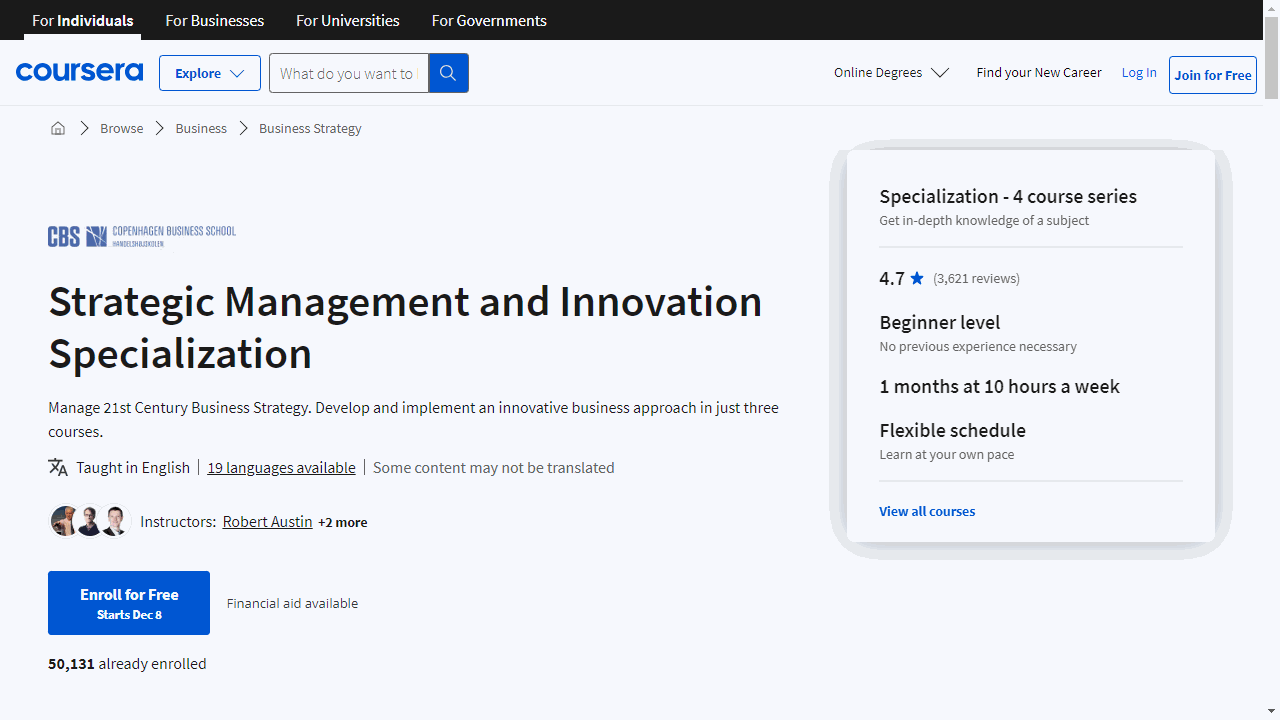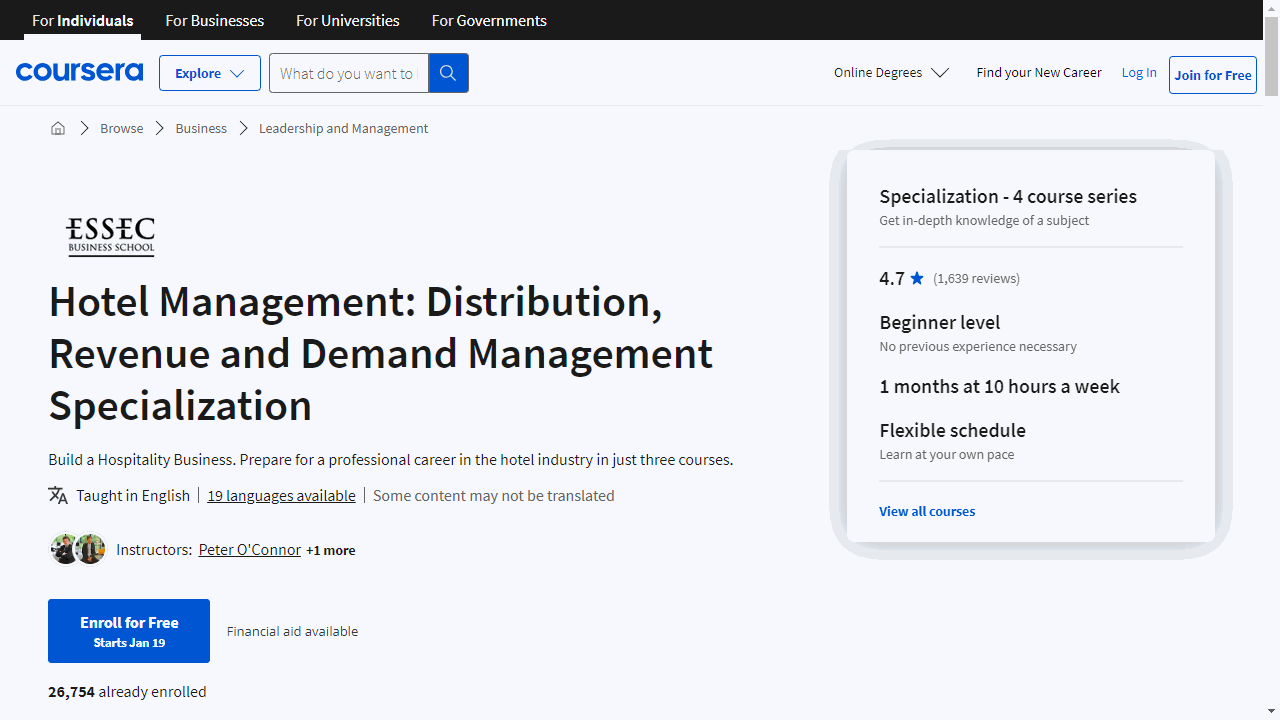Finding the right management course can be a challenge, especially with the vast selection available on Coursera.
You’re looking for something that will help you advance your career, but it can be overwhelming to sort through all the options and figure out which ones are genuinely valuable.
You want a course that’s comprehensive, engaging, and taught by experts, but also aligns with your learning style and goals.
We’ve sifted through the best management courses on Coursera and have come up with our top picks.
For the best overall management course, we recommend Management Consulting Specialization by Emory University.
This specialization is packed with the essentials you need to thrive in the management consulting world, taught by industry experts like ex-Deloitte consultant John Kim.
You’ll learn valuable problem-solving techniques, explore the consulting career, understand the inner workings of consulting firms, master the art of breaking down complex problems, and build robust Excel models.
But this isn’t the only great course on Coursera.
Keep reading for more recommendations tailored to different learning styles and career goals, including courses focused on managerial economics, human resource management, strategic leadership, supply chain management, and more.
Management Consulting Specialization
This specialization offered by Emory University is packed with the essentials you need to thrive in the management consulting world, taught by industry experts like ex-Deloitte consultant John Kim.
Kick off with “Introduction to Management Consulting” to grasp the core of what consultants do and the skills that make them indispensable to clients.
You’ll explore the consulting career and learn problem-solving techniques that can immediately benefit your work.
Move on to “Getting a Consulting Job” to understand the inner workings of consulting firms and what it takes to succeed in case interviews.
This course is your guide to networking with recruiters and identifying what firms seek in their consultants.
In “Consulting Approach to Problem Solving,” you’ll master the art of breaking down complex problems and using data to inform decisions.
The course introduces you to the DMAIC framework, enhancing your ability to approach business challenges methodically.
“Consulting Tools and Tips” equips you with the ability to quickly learn new topics and develop a toolkit for data creation through client interactions and industry analysis.
You’ll learn to ask the right questions and build robust Excel models.
Lastly, “Consulting Presentations and Storytelling” teaches you to craft impactful presentations that tell a clear story.
You’ll learn to align stakeholders, make assumptions transparent, and deliver your findings with confidence.
Throughout the specialization, you’ll acquire practical skills in project management, data analysis, executive presence, and business strategy.
Managerial Economics and Business Analysis Specialization
This specialization, offered by the esteemed Gies College of Business, equips you with the analytical tools necessary for astute business decision-making.
The course “Firm Level Economics: Consumer and Producer Behavior” delves into the intricacies of market dynamics.
You’ll gain a clear understanding of how prices influence consumer and producer choices, and how these interactions determine market equilibrium.
The concepts of demand elasticity and cost theory are broken down, providing you with a solid foundation to analyze business constraints and pricing strategies.
Moving on, “Firm Level Economics: Markets and Allocations” expands on market structures and the role of government intervention.
You’ll learn to model the effects of external shocks on markets and assess the efficiency of different economic systems.
This course also addresses market failures and the optimal government responses, enhancing your ability to navigate complex market conditions.
Data is the lifeblood of modern business, and “Exploring and Producing Data for Business Decision Making” teaches you to harness it effectively.
You’ll become proficient in summarizing and interpreting data, understanding the importance of sampling, and applying statistical concepts using Excel.
These skills are crucial for making informed business decisions in an uncertain world.
“Inferential and Predictive Statistics for Business” further develops your statistical acumen.
It focuses on hypothesis testing, comparing population metrics, and employing linear regression for forecasting.
The course emphasizes practical application, particularly through Excel, ensuring that you can apply these statistical methods directly to real-world business scenarios.
For those with an interest in finance, “Banking and Financial Institutions” offers a deep dive into the sector’s inner workings.
You’ll explore the structure of financial institutions, the services they offer, and the evolving landscape of financial regulation.
This course provides a conceptual framework to understand how financial innovations and regulations impact the economy.
Lastly, “Central Banks and Monetary Policy” demystifies the role of central banks in shaping economic policy.
You’ll grasp the relationships between interest rates, inflation, and unemployment, and learn to interpret how central bank decisions affect financial markets and the broader economy.
Each course in this specialization builds upon the last, culminating in a well-rounded understanding of managerial economics and business analysis.
The skills you acquire are not only theoretical but also practical, with a strong emphasis on real-world application, particularly through the use of Excel for data analysis.
Foundations of Management Specialization
This specialization by IESE Business School packs practical knowledge and skills to elevate your management game.
You’ll be guided by the expertise of management thinkers like Peter Drucker, ensuring you’re learning from the best.
Dive into “Accounting: Principles of Financial Accounting” to decode the language of business.
You’ll learn to read and interpret financial statements, essential for making informed decisions.
With a focus on Dupont Analysis, Management Accounting, and Business Analysis, you’ll be equipped to interact confidently with financial professionals.
“Finance for Managers” goes beyond the basics, teaching you to uncover the stories behind balance sheets and income statements.
You’ll grasp how managerial decisions ripple through a company’s finances, and you’ll develop skills in Management Styles and Organizational Culture that are vital for leadership.
In “Marketing: Customer Needs and Wants,” you’ll get inside the minds of your customers.
This course covers marketing fundamentals, product pricing, channel decisions, and brand building.
You’ll also refine your communication strategy to effectively reach and engage your audience.
“Organizational Behavior: How to Manage People” offers insights into what motivates individuals and teams.
You’ll explore leadership, teamwork, and the impact of organizational and national cultures on workplace dynamics.
This course is your key to managing people with empathy and effectiveness.
Finally, “Analysis of Business Problems” challenges you to apply your new skills to a real-world scenario faced by GAS GAS, an off-road motorcycle manufacturer.
You’ll learn a robust six-step methodology to dissect business problems, integrating insights from accounting, finance, marketing, and organizational behavior to drive positive outcomes.
Each course is a building block, helping you understand key entities like balance sheets, income statements, and organizational culture.
Human Resource Management: HR for People Managers Specialization
This specialization, offered by the University of Minnesota, is a comprehensive series designed to equip you with the essential skills to excel in HR and beyond.
The journey begins with “Preparing to Manage Human Resources,” a course that sets the stage for your HR education.
It’s perfect for beginners or those seeking a refresher, offering insights into various management strategies, legal considerations, and employee motivation.
You’ll emerge with a solid foundation, ready to tackle more complex HR issues.
Then, “Recruiting, Hiring, and Onboarding Employees” takes you through the crucial process of building a team.
You’ll explore how to align recruitment with your company’s strategy and delve into the legal aspects of hiring.
The course also covers modern recruitment techniques, including leveraging social media and analytics.
Onboarding is the final piece of this puzzle, ensuring new hires are engaged and integrated smoothly into your organization.
In “Managing Employee Performance,” the focus shifts to development and growth.
This course isn’t just about evaluations; it’s about fostering an environment where clear communication and constructive feedback help employees and the organization thrive.
You’ll learn to set expectations and use appraisals to guide your team’s progress.
Compensation is more than just a paycheck, and “Managing Employee Compensation” proves just that.
This course provides a deeper understanding of how to design a compensation system that aligns with your organization’s needs and goals.
You’ll gain insights into salary structures, incentives, benefits, and even non-monetary rewards, all while ensuring compliance with pay regulations.
The capstone project, “Human Resources Management Capstone: HR for People Managers,” allows you to apply what you’ve learned to real-world scenarios.
You’ll identify HR challenges and create actionable plans to address them, applying your knowledge to improve workplace dynamics.
Each course is designed to build on the last, ensuring a fluid learning experience that’s both practical and applicable.
You’ll gain a suite of skills that are immediately relevant to any HR role.
The flexibility of learning at your own pace makes this specialization a convenient way to advance your career in human resources.
Strategic Leadership and Management Specialization
The specialization from the University of Illinois at Urbana-Champaign begins with “Leading Teams: Developing as a Leader,” where you’re not just learning about leadership; you’re actively shaping your own style.
This course helps you understand the core of leadership, assess your competencies, and guides you in making ethical decisions while fostering trust within your team.
Building on that foundation, “Leading Teams: Building Effective Team Cultures” takes you into the realm of team dynamics.
Here, you’ll learn to cultivate a team culture that prioritizes safety, engagement, and growth, setting the stage for high-performing teams.
With “Designing the Organization,” you’ll gain a strategic edge in understanding organizational complexities.
This course equips you with theories and frameworks to design an organization that’s adaptable and poised for success.
“Managing the Organization” complements this by focusing on the practical aspects of management.
You’ll tackle real-world managerial challenges, learn to wield power strategically, and navigate the intricacies of organizational culture and ethics.
For those with an eye on the bigger strategic picture, “Business Strategy” offers insights into how organizations create and sustain value.
You’ll master strategic management tools and learn to align internal operations with the external environment for optimal performance.
“Corporate Strategy” expands your perspective to the corporate level, where you’ll learn to manage multiple business units and stakeholders.
This course covers decisions on vertical integration, diversification, and global strategy, all crucial for a well-rounded corporate leader.
The capstone project is where theory meets practice.
You’ll apply your newfound knowledge to a real business challenge, demonstrating your ability to create strategic value and showcasing your skills to potential employers.
The skills you’ll gain are not just theoretical; they’re practical, in-demand, and directly applicable to your career.
Moreover, these courses are part of the Gies College of Business’ respected online programs, meaning you’re receiving a quality education that can also contribute to further academic achievements if you choose to pursue them.
Supply Chain Management Specialization
This series of courses is designed to equip you with the essential skills needed to navigate and optimize the supply chain, a critical component of any business operation.
The journey begins with “Supply Chain Logistics,” where you’ll gain insight into the delivery of goods from origin to consumer.
This course breaks down the logistics landscape, covering transportation, warehousing, and inventory.
You’ll learn to evaluate transportation options, design efficient warehouses, and manage inventory effectively.
This foundational course is accessible even if you’re new to the field, though a basic grasp of business concepts will help you hit the ground running.
Moving on to “Supply Chain Operations,” you’ll delve into the processes that ensure consistent production quality.
The course introduces you to Six Sigma and Lean methodologies, empowering you to identify and eliminate waste, thereby enhancing operational efficiency.
A familiarity with spreadsheets and the concepts from the logistics course will serve you well here.
In “Supply Chain Planning,” the focus shifts to the art of balancing supply with demand.
You’ll master various forecasting methods to inform a Sales and Operations Plan, ensuring that production levels are in tune with market needs.
This course is particularly valuable for those looking to avoid the pitfalls of overproduction or stock shortages.
“Supply Chain Sourcing” takes you into the realm of supplier management.
You’ll learn to navigate the supplier selection process and develop strategies for effective supplier segmentation.
You’ll be equipped to establish and maintain productive relationships with suppliers, a key aspect of any robust supply chain.
The specialization culminates with “Supply Chain Management Strategy,” a capstone course that challenges you to apply your newfound knowledge to real-world scenarios.
Here, you’ll demonstrate your ability to craft comprehensive supply chain strategies, integrating the tools and techniques from the preceding courses.
From forecasting and strategic sourcing to risk management, you’ll emerge with a well-rounded understanding of how to make a supply chain efficient and responsive.
Investment Management Specialization
This specialization offered by University of Geneva gives you a comprehensive understanding of the investment world.
Start with “Understanding Financial Markets” to grasp the essentials of financial markets and their connection to the economy.
You’ll learn how to calculate and interpret the movements of stock and bond prices, understand the concept of risk, and explore diverse markets like gold and real estate.
Real-world applications from UBS experts will show you how these concepts are used in a leading global bank, equipping you with practical skills in portfolio theories and risk management.
In “Meeting Investors’ Goals,” you’ll delve into the psychology behind investment decisions, uncovering how biases and emotions can influence market outcomes.
This course will also introduce you to various portfolio construction methods and investment styles, enhancing your knowledge in investment management and socially responsible investing.
“Portfolio and Risk Management” is where theory meets practice.
You’ll learn how to create optimal portfolios through strategic asset allocation and manage investment risks.
UBS professionals provide insights, ensuring you understand the practical aspects of bond markets and financial markets.
“Securing Investment Returns in the Long Run” demystifies the active versus passive investing debate and teaches you how to evaluate investment performance.
You’ll also discover the impact of sustainable finance, neurofinance, and fintech on the future of investment management.
The Capstone project, “Planning your Client’s Wealth over a 5-year Horizon,” is your chance to apply your learning.
You’ll design a wealth plan for a character, considering economic changes, emotional biases, portfolio optimization, and performance measurement.
By completing this specialization, you’ll gain valuable skills in portfolio construction, cognitive bias understanding, and investment style differentiation.
You’ll also become proficient in Microsoft Excel, a vital tool for financial analysis.
Financial Management Specialization
Navigating the world of finance requires a solid foundation, and the “Financial Management Specialization” on Coursera, backed by the University of Illinois, offers a structured path to acquiring this expertise.
Begin with “Financial Accounting: Foundations,” where you’ll get to grips with the core principles of financial accounting.
This isn’t just about memorizing terms; it’s about understanding the significance of financial statements and how transactions shape the financial narrative of a business.
Building on that foundation, “Financial Accounting: Advanced Topics” delves into the complexities of asset and liability accounting, equity, and the all-important cash flows statement.
This course equips you with the analytical tools to assess a company’s financial health beyond the surface numbers.
For those interested in the dynamics of the stock market, “Investments I: Fundamentals of Performance Evaluation” introduces you to the interplay between risk and return.
You’ll learn to use models like CAPM for investment evaluation, all while honing practical Excel skills that are indispensable in the finance industry.
“Investments II: Lessons and Applications for Investors” continues your investment education, offering insights into the behaviors that drive investor decisions and the performance of mutual funds.
This course provides a deeper understanding of how to navigate and succeed in the investment landscape.
Shifting focus to corporate finance, “Corporate Finance I: Measuring and Promoting Value Creation” teaches you how to use financial information to drive value creation within a company.
From liquidity management to investment evaluation, you’ll learn to make decisions that align with shareholder interests.
“Corporate Finance II: Financing Investments and Managing Risk” addresses the strategic side of finance, including how companies manage debt, equity, and financial risk.
You’ll explore the intricacies of financial instruments and how they can be used to maintain a firm’s financial stability.
The capstone project is where theory meets practice.
You’ll synthesize the knowledge from each course to develop a comprehensive financial management plan, showcasing your ability to apply your learning to real-world scenarios.
Each course in this specialization is designed to build upon the last, ensuring a progressive learning experience.
You’ll gain a well-rounded skill set in corporate finance, risk management, and investment strategy. And as part of the iMBA program, these courses offer a taste of an MBA education at a fraction of the cost.
Value Chain Management Specialization
Provider: University of Illinois at Urbana-Champaign
By choosing these courses, you’ll develop a robust skill set in managerial accounting, operations management, and marketing strategy, all while learning from a prestigious institution.
Dive into “Managerial Accounting: Cost Behaviors, Systems, and Analysis” to master the art of using accounting as a decision-making tool.
You’ll tackle cost information organization and activity-based costing (ABC), essential for internal decision-making and identifying opportunities in the supply chain.
“Managerial Accounting: Tools for Facilitating and Guiding Business Decisions” builds on this foundation, focusing on resource allocation and strategic performance measurement.
You’ll learn to craft master budgets, evaluate capital investments, and understand the implications of decentralization.
If operations are your interest, “Operations Management: Organization and Analysis” offers a deep dive into the connection between operations and other business functions.
You’ll gain skills in strategic decision-making and process evaluation, crucial for tailoring operations to customer segments.
For a focus on continuous improvement, “Operations Management: Quality and Supply Chain” teaches you to set priorities and execute projects that enhance processes, a vital competency for sustaining growth and competitiveness.
Marketing enthusiasts will benefit from “Developing a Winning Marketing Strategy,” where you’ll explore how marketing creates value through the marketing mix.
This course equips you with analytical frameworks to address real-world business challenges.
Further refine your marketing expertise with “Developing a Marketing Mix for Growth,” offering an in-depth analysis of marketing mix elements.
You’ll learn to evaluate pricing models, distribution channels, and create compelling advertising, skills that are key to strategic marketing decisions.
Each course is a component of the Gies College of Business’ online offerings, meaning the knowledge you gain can potentially contribute to an iMBA or iMSM degree.
Strategic Technology Management Specialization
Provider: University of Illinois at Urbana-Champaign
This specialization hones in on the critical skills needed to thrive in a world where innovation is constant.
In “Technology Strategy: Creative Destruction,” you’ll tackle the challenge of technological change head-on.
Learn to analyze market dynamics and develop strategies that keep your company competitive.
This course equips you with the tools to navigate through the “gales of creative destruction” and secure a leading position in the knowledge economy.
“Customer Centric Innovation” shifts the focus to the heart of innovation: the customer.
Here, you’ll learn to capture and utilize customer insights to drive product development.
By understanding the critical role customers play, you’ll be able to craft innovations that resonate and lead to success.
The third course, “Managing Innovation: Ambidexterity, Teams and Leading Change,” is about balancing the new with the established.
You’ll gain insights into leading teams and managing change, ensuring that your innovation initiatives are not just creative but also effective and well-implemented.
Throughout these courses, you’ll build competencies in strategic management, R&D management, and innovation management.
You’ll emerge with the ability to address resistance to change, orchestrate organizational transformation, and lead innovation teams with confidence.
Business Data Management and Communication Specialization
This specialization is offered by the University of Illinois at Urbana-Champaign.
Start with “Financial Accounting: Foundations” to grasp the essentials of financial statements and accrual accounting.
You’ll learn to interpret and record financial transactions, crucial for any business professional.
This course is a component of the University of Illinois’s iMBA, ensuring you’re receiving a high-caliber education.
Next, “Financial Accounting: Advanced Topics” delves into the lifespan of assets and the intricacies of liabilities and equity.
Mastering the cash flow statement is key, and this course ensures you can analyze a company’s liquidity with confidence.
For a practical approach to data, “Introduction to Business Analytics: Communicating with Data” teaches you to select the right analytics tools and apply them to real-world business scenarios.
It’s about making data work for you in making informed decisions.
“Introduction to Business Analytics with R” is hands-on, focusing on the R programming language.
You’ll use RStudio to manage and prepare data for analysis, bridging the gap between business challenges and data solutions.
“Infonomics I: Business Information Economics and Data Monetization” redefines how you view information—as an asset that can be monetized.
This course encourages creative thinking to unlock the financial potential of data.
Finally, “Infonomics II: Business Information Management and Measurement” teaches you to manage information as an asset.
You’ll learn to measure data’s value, navigating the complexities of information ownership and leveraging data for business advantage.
Strategic Management and Innovation Specialization
This specialization offered by Copenhagen Business School is tailored for the modern business landscape, where innovation and perception often trump traditional assets.
Kick off with “Strategic Management,” where you’ll learn to navigate the shifting terrain of business strategy.
You’ll understand why strategic thinking is crucial and how to evolve past outdated strategies.
This course also sets you up for the specialization’s Capstone Project.
Move on to “Strategy Formulation,” where you’ll get hands-on with creating strategies that align with your company’s goals.
You’ll tackle real-world scenarios, learning to craft strategies that stand out in various markets and industries.
Then, “Strategy Implementation” teaches you to turn those strategies into action.
You’ll discover how to set clear objectives, choose supportive organizational structures, and communicate your vision effectively to ensure successful implementation.
The journey culminates with the “Strategic Management - Capstone Project,” where you apply your newfound skills to analyze and strategize for actual business cases.
With a manageable weekly commitment of 10 hours, you’ll build competencies in strategic management, planning, and thinking.
You’ll also learn to identify and address implementation risks.
Hotel Management: Distribution, Revenue and Demand Management Specialization
Provider: ESSEC Business School
If you’re aiming to excel in the hotel industry and make informed decisions that drive profits, these courses are crafted for you.
Get ready to transform your career with knowledge from ESSEC Business School and industry leaders like Duetto, ACCOR, and FAIRMONT.
This set of courses is a deep dive into the critical aspects of the hotel industry, offering practical skills and insights from top experts.
In “The Fundamentals of Hotel Distribution,” you’ll navigate the complex web of hotel channels.
Learn to boost direct bookings on your brand.com website and leverage online travel agents (OTAs) effectively.
This course is your foundation in the fast-changing world of hotel distribution.
Move on to “The Fundamentals of Revenue Management: The Cornerstone of Revenue Strategy,” where you’ll explore how to price hotel rooms using analytics to predict consumer behavior.
This course, developed with insights from Duetto, equips you with knowledge in segmentation, forecasting, and pricing to drive revenue.
“Demand Management: Breaking down today’s commercial silos” addresses the challenge of integrating key commercial disciplines.
Covering asset management, demand generation, digital marketing, and demand optimization, this course helps you align teams and strategies for maximum profitability.
Finally, apply what you’ve learned in a practical scenario with “Hôtel ‘De l’étoile’ - a hotel in crisis?”
As the Director of Business Development, you’ll analyze real data and make strategic decisions to turn around a struggling hotel.
By completing this specialization, you’ll gain competencies in hospitality management, revenue management, and forecasting.
